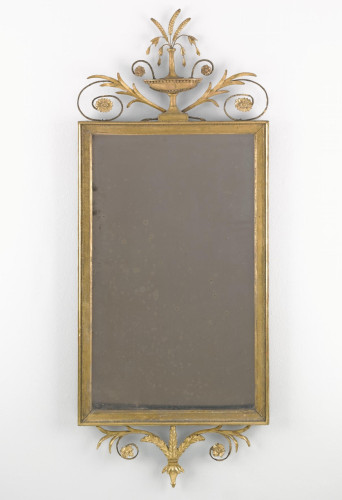51/2006
Collection
Furniture
Brief description
Gilt carved wood and gesso pier glass surmounted by a vase, made in England, c.1790.
Object name
mirror
pier glass
pier glass
Object number
51/2006
Location
On Display
Production organisation
Unknown (manufacturer)
Production date
c.1790 (manufactured)
Production place
England (manufactured)
Period
Georgian (1714-1837)
Material
glass
gesso
gilding
deal
iron
brass
gold
gesso
gilding
deal
iron
brass
gold
Technique
carved
gilded
gilded
Physical description
Rectangular, gilt frame with beaded ovolo moulded edge surmounted by a vase with a spray of wheat ears and husks/bell flowers flanked by a scrolling palm and flowerhead. The base with a tied foliage spray flanked by scrolling palm and flowerhead. The glass appears to be original. There is a thick mahogany board at the back.
The glass is slightly foxed all over with some spotting and losses to the left hand side. It also has a red oxide on the back. The back of the frame has screw holds in the upper portion of each side and a pair of holes on the lower end of each side of the frame. There are four holes to each side of the base of the frame which may have been used as for candle branches.
The glass is slightly foxed all over with some spotting and losses to the left hand side. It also has a red oxide on the back. The back of the frame has screw holds in the upper portion of each side and a pair of holes on the lower end of each side of the frame. There are four holes to each side of the base of the frame which may have been used as for candle branches.
Content object
mirror
Dimensions
Height: 129cm
Width: 51.3cm
Width: 51.3cm
Website keywords
mirrors
Label
Label text for the exhibition At Home with the World, Geffrye Museum (20 March 2012- 9 September 2012):
Mirror
This is known as a ‘looking glass’ and its frame is decorated with gilded motifs like vases and ears of corn, typical of neoclassicism. It echoes the work of architects such as Robert Adam who had visited classical ruins and were inspired to create works of lightness and elegance.
Mirror
This is known as a ‘looking glass’ and its frame is decorated with gilded motifs like vases and ears of corn, typical of neoclassicism. It echoes the work of architects such as Robert Adam who had visited classical ruins and were inspired to create works of lightness and elegance.






